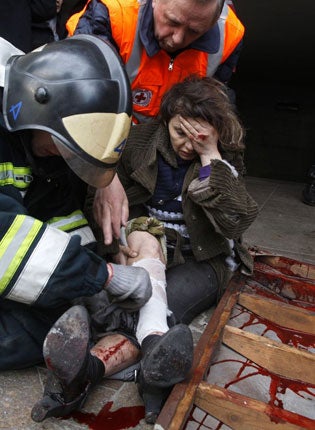Rush-hour bomb explosion on Minsk metro leaves 11 dead

Eleven people were reported dead and 126 injured last night after an explosion at a metro station in the Belarusian capital of Minsk. Much about the blast was unclear yesterday evening, including who may have been behind it.
The powerful explosion rocked the evening rush hour at the central Oktyabrskaya station, close to the offices of President Alexander Lukashenko. The country's state news agency said that 11 people were dead. Unofficial reports put the death toll at 35.
Eyewitnesses spoke of a huge explosion that went off as the train doors opened at the station. The blast was so strong that trains at nearby stations also shook from it, witnesses said. Later, plumes of dark smoke were seen emerging from the metro exits as survivors rushed up for air.
"The doors [of the train] opened and then there was an explosion," an eyewitness named Igor told Reuters. "I saw people lying on the floor without moving. There was a lot of blood." Paramedics carried the injured, including one person who had lost both legs, up the escalators and rushed them to hospitals.
Mr Lukashenko, a hardline autocrat who has been called the "last dictator in Europe", was criticised in the West for presidential elections in December that saw several of the opposition candidates end up in prison.
In televised remarks yesterday, Mr Lukashenko linked the explosion to a previous unsolved blast in 2008 at an Independence Day celebration in which about 50 people were injured. "These are perhaps links in a single chain," he said.
"We must find out who gained by undermining peace and stability in the country, who stands behind this. I do not rule out that this [the blast] was a gift from abroad."
The country has a heavy security presence and is not an obvious target for terrorists aiming to attack civilians. Unlike in neighbouring Russia, where two suicide bombers from the country's mainly Muslim North Caucasus region hit the metro system last year, there is no history of Islamic insurgency in Belarus, while the pro-Western opposition forces would be unlikely to target civilians.
On Twitter and in blogs yesterday, many opposition-minded Belarusians voiced suspicions that if the blast does turn out to have been a bomb, a feud in the country's security services or a darker conspiracy was the most likely cause.
In February, Mr Lukashenko criticised events in Tunisia and Egypt, where authoritarian presidents had been brought down by public uprisings, threatening to use the army if any Belarusians got any similar ideas, and saying if people tried to topple him with demonstrations it would create "another Chechnya".
A former collective farm boss, he has run the country since 1994. After the December elections, the EU reimposed a travel ban on Mr Lukashenko and over 100 of his officials.
Yesterday's explosion also comes just a week after a 30 per cent managed devaluation of the Belarusian rouble, which analysts say is likely to plunge the country further into economic hardship. The nation's economy is still largely run on Soviet-era lines and relies on Russian loans and aid.
In the hours after the blast, Mr Lukashenko said he was taking the investigation of the blast under his personal control.
Join our commenting forum
Join thought-provoking conversations, follow other Independent readers and see their replies
Comments
Bookmark popover
Removed from bookmarks